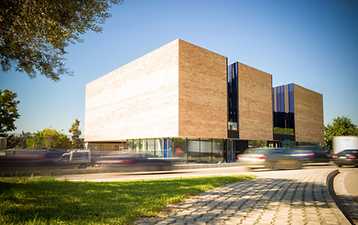Ceramics
Haswa Ceramics
I founded Haswa Ceramics, a production workshop that specializes in
designing and producing architectural ceramics. By establishing in-house clay processing and laboratory testing capabilities we are able to work with a wide selection of locally sourced clays characterized by unique colors, textures, and qualities. We combine traditional shaping processes and manufacturing
technology to showcase the inherent beauty and distinctive character of
Jordanian ceramics, and tell a story of its history and origin.


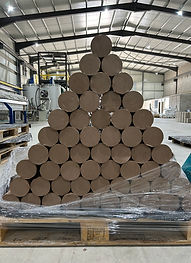
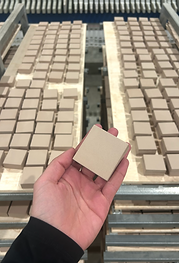
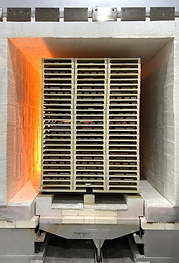
Ceramics
Raw Material Testing + Clay Body Development
While Jordan predominantly relies on imported clay for production, the
country features a plethora of deposits steeped in centuries of ceramic craftsmanship. Following extensive research and collection of a wide range
of Jordanian clays - I performed in-depth testing of raw material chemical, mechanical and physical properties in order to formulate clay bodies
suitable for architectural ceramic production.




Ceramics
Documenting Traditional Techniques
Jordan has a 7,000-year-old history of ceramic production - as these practices rapidly disappear it becomes increasingly important to document them in order to preserve, revive, and highlight their cultural and historical significance. I spent time documenting traditional techniques across the country, from hand-built pottery in the north featuring unique inclusions, to wheel-thrown vessels in the south made from clay wedged by foot.



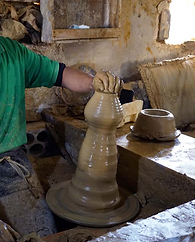
Material Specialist
Museum of Jesus' Baptism
I collaborated with Toshiko Mori Architect as a material specialist on a competition proposal for the new Museum of Jesus’ Baptism in Jordan.
The project unfolds as a series of pavilions and gardens that explore botany, geology, archaeology, and anthropology, revealing how nature, culture, and faith intertwine in this sacred landscape. The museum is defined by a series of thin tile barrel vaults built with tiles and brick made out of local Jordanian clay.



Ceramics
Shades of Terracotta
Exhibited at the Saudi Arabia Museum of Contemporary Art as part of the exhibition "Adaptability". Shades of Terracotta explores the impact of varying processing methods on the behavior of iron rich clays resulting in a gradient. As the color changes the mechanical properties also change from porous to vitrified, opening up the possibility of using terracotta to serve multiple functions within architectural assemblies.


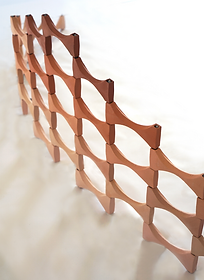
Ceramics
Clay in Context
Exhibited at Design Doha Biennale as part of the exhibition " Arab Design Now". A series of vessels showcasing the distinct clays found in Jordan and reflecting subtle gradations in color that are characteristic of its diverse geography. Harvested and processed by hand, the clays tell stories of the terrain and carry a history of the land and civilizations that inhabited it.



Architecture
Brooklyn Public Library
I worked as part of a design team, at Toshiko Mori Architect, on the
restoration of the Brooklyn Public Library Central Branch at Grand Army
Plaza. The project entailed the refurbishment of existing features and the transformation of administrative areas into public zones.



Architecture
Bob Greenberg Selects
During my time at Toshiko Mori Architect, I worked on the design of an installation at Copper Hewitt Smithsonian Design Museum which exhibited
a range of significant works selected by Bob Greenberg illustrating
how technology has propelled design innovations in form, style
and function over the past 65 years.
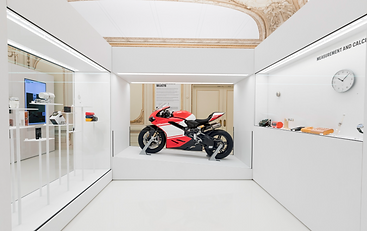


Architecture
A Lisbon Story
Located by the Tagus river in Lisbon, the boat house sits underground
creating a plaza above, allowing views out into the horizon. The plaza is covered by a large canopy - announcing the entry into the boat house
and creating a shaded area for gathering. The ground is perforated with
large openings allowing light to come into courtyard spaces within
the submerged building

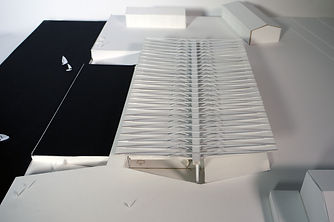
Architecture
Collective Space for the Extended Metropolis
The project aims to create a shared space inviting the communities from two sides of the canal to interact, by introducing a school bridge that doubles as a transit hub. The bridge brings public amenities to a monolithic scale, and generates with its dramatic presence a sense of urbanity within its depleted surroundings. Sectional changes allow private and public spaces to coexist.

Architecture
Imprecise Tropics
Colombia is one of the most prominent coffee producers in the world, yet the country lacks the culture of drinking high quality coffee. This project aims to promote coffee drinking by bringing together coffee production, consumption and education in one building. The architecture follows the unique topography of the site. The roof is a gesture bringing together different wings and creating shaded areas for social activities to occur underneath it.
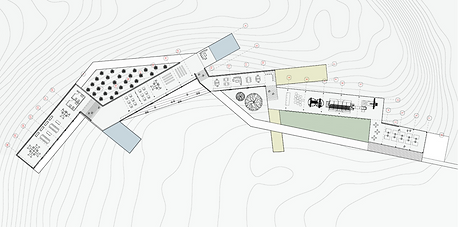

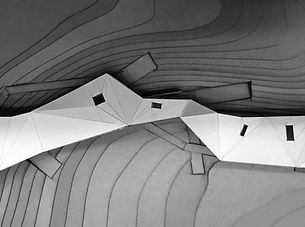
Architecture
Byblos Town Hall
As an intern at Hashim Sarkis Studios, I worked as part of a team on the design of a new town hall for one of the oldest cities in the world and a UNESCO World Heritage Site. In an effort to bridge the divide between the tourist-heavy historic core and the suburbs where most residents live, the town hall is situated at the interchange of the highway separating the two areas, within a public park. The building is divided into three large blocks each housing a different component, all connected at the ground level.
